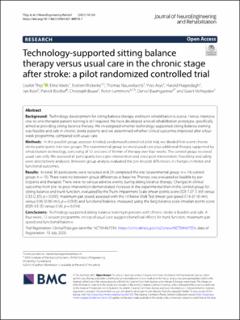Please use this identifier to cite or link to this item:
https://doi.org/10.21256/zhaw-23054| Publication type: | Article in scientific journal |
| Type of review: | Peer review (publication) |
| Title: | Technology-supported sitting balance therapy versus usual care in the chronic stage after stroke : a pilot randomized controlled trial |
| Authors: | Thijs, Liselot Voets, Eline Wiskerke, Evelien Nauwelaerts, Thomas Arys, Yves Haspeslagh, Harold Kool, Jan Bischof, Patrick Bauer, Christoph Lemmens, Robin Baumgartner, Daniel Verheyden, Geert |
| et. al: | No |
| DOI: | 10.1186/s12984-021-00910-7 10.21256/zhaw-23054 |
| Published in: | Journal of NeuroEngineering and Rehabilitation |
| Volume(Issue): | 18 |
| Issue: | 120 |
| Issue Date: | 28-Jul-2021 |
| Publisher / Ed. Institution: | BioMed Central |
| ISSN: | 1743-0003 |
| Language: | English |
| Subjects: | Stroke; Technology-supported; Sitting balance; Trunk rehabilitation; Randomized controlled trial; Feasibility |
| Subject (DDC): | 615.82: Physical therapy 616.8: Neurology, diseases of nervous system |
| Abstract: | Background: Technology development for sitting balance therapy and trunk rehabilitation is scarce. Hence, intensive one-to-one therapist-patient training is still required. We have developed a novel rehabilitation prototype, specifically aimed at providing sitting balance therapy. We investigated whether technology-supported sitting balance training was feasible and safe in chronic stroke patients and we determined whether clinical outcomes improved after a four-week programme, compared with usual care. Methods: In this parallel-group, assessor-blinded, randomized controlled pilot trial, we divided first-event chronic stroke participants into two groups. The experimental group received usual care plus additional therapy supported by rehabilitation technology, consisting of 12 sessions of 50 min of therapy over four weeks. The control group received usual care only. We assessed all participants twice pre-intervention and once post-intervention. Feasibility and safety were descriptively analysed. Between-group analysis evaluated the pre-to-post differences in changes in motor and functional outcomes. Results: In total, 30 participants were recruited and 29 completed the trial (experimental group: n = 14; control group: n = 15). There were no between-group differences at baseline. Therapy was evaluated as feasible by participants and therapist. There were no serious adverse events during sitting balance therapy. Changes in clinical outcomes from pre- to post-intervention demonstrated increases in the experimental than in the control group for: sitting balance and trunk function, evaluated by the Trunk Impairment Scale (mean points score (SD) 7.07 (1.69) versus 0.33 (2.35); p < 0.000); maximum gait speed, assessed with the 10 Metre Walk Test (mean gait speed 0.16 (0.16) m/s versus 0.06 (0.06) m/s; p = 0.003); and functional balance, measured using the Berg balance scale (median points score (IQR) 4.5 (5) versus 0 (4); p = 0.014). Conclusions: Technology-supported sitting balance training in persons with chronic stroke is feasible and safe. A four-week, 12-session programme on top of usual care suggests beneficial effects for trunk function, maximum gait speed and functional balance. |
| URI: | https://digitalcollection.zhaw.ch/handle/11475/23054 |
| Fulltext version: | Published version |
| License (according to publishing contract): | CC BY 4.0: Attribution 4.0 International |
| Departement: | School of Health Sciences School of Engineering |
| Organisational Unit: | Institute of Mechanical Systems (IMES) Institute of Physiotherapy (IPT) |
| Appears in collections: | Publikationen Gesundheit Publikationen School of Engineering |
Files in This Item:
| File | Description | Size | Format | |
|---|---|---|---|---|
| 2021_Thijs-etal_Technology-supported-sitting-balance-therapy.pdf | 1.67 MB | Adobe PDF |  View/Open |
Show full item record
Thijs, L., Voets, E., Wiskerke, E., Nauwelaerts, T., Arys, Y., Haspeslagh, H., Kool, J., Bischof, P., Bauer, C., Lemmens, R., Baumgartner, D., & Verheyden, G. (2021). Technology-supported sitting balance therapy versus usual care in the chronic stage after stroke : a pilot randomized controlled trial. Journal of NeuroEngineering and Rehabilitation, 18(120). https://doi.org/10.1186/s12984-021-00910-7
Thijs, L. et al. (2021) ‘Technology-supported sitting balance therapy versus usual care in the chronic stage after stroke : a pilot randomized controlled trial’, Journal of NeuroEngineering and Rehabilitation, 18(120). Available at: https://doi.org/10.1186/s12984-021-00910-7.
L. Thijs et al., “Technology-supported sitting balance therapy versus usual care in the chronic stage after stroke : a pilot randomized controlled trial,” Journal of NeuroEngineering and Rehabilitation, vol. 18, no. 120, Jul. 2021, doi: 10.1186/s12984-021-00910-7.
THIJS, Liselot, Eline VOETS, Evelien WISKERKE, Thomas NAUWELAERTS, Yves ARYS, Harold HASPESLAGH, Jan KOOL, Patrick BISCHOF, Christoph BAUER, Robin LEMMENS, Daniel BAUMGARTNER und Geert VERHEYDEN, 2021. Technology-supported sitting balance therapy versus usual care in the chronic stage after stroke : a pilot randomized controlled trial. Journal of NeuroEngineering and Rehabilitation. 28 Juli 2021. Bd. 18, Nr. 120. DOI 10.1186/s12984-021-00910-7
Thijs, Liselot, Eline Voets, Evelien Wiskerke, Thomas Nauwelaerts, Yves Arys, Harold Haspeslagh, Jan Kool, et al. 2021. “Technology-Supported Sitting Balance Therapy versus Usual Care in the Chronic Stage after Stroke : A Pilot Randomized Controlled Trial.” Journal of NeuroEngineering and Rehabilitation 18 (120). https://doi.org/10.1186/s12984-021-00910-7.
Thijs, Liselot, et al. “Technology-Supported Sitting Balance Therapy versus Usual Care in the Chronic Stage after Stroke : A Pilot Randomized Controlled Trial.” Journal of NeuroEngineering and Rehabilitation, vol. 18, no. 120, July 2021, https://doi.org/10.1186/s12984-021-00910-7.
Items in DSpace are protected by copyright, with all rights reserved, unless otherwise indicated.